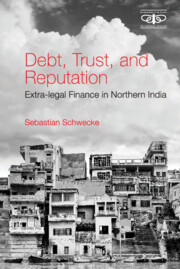4 - Containment
Published online by Cambridge University Press: 30 November 2021
Summary
A British bank is run with precision A British home requires nothing less! Tradition, discipline, and rules must be the tools Without them - disorder! Chaos! Moral disintegration! In short, you have a ghastly mess!
The shift in policy towards granting the courts discretionary powers led to a significant drop in litigation cases reaching the higher-level courts, visible almost as soon as the Usurious Loans Bill was enacted in 1918. There are indications that matters of usury continued to be dealt with for a time by small causes courts, though. In principle, the shift in legal doctrine on credit markets marked a significant rupture. It rescinded the operation of contractual law for transactions that were defined to be usurious, just as much as the repeal of the usury laws in 1855 – in principle – had imposed contractual law on the earlier economies of debt. The policy shift towards the doctrine of unconscionable bargains clearly relates to the endeavour to define propriety in economic relations, though the definition of the ‘proper swindle’ (Birla 2009) with regard to credit markets took on an ambiguity that needs to be emphasized here. While marking a broad array of credit transactions as improper, and dissecting these from the proper debt relations that continued to fall under the purview of contractual law, the shift towards discretionary powers did not envision state supervision of propriety through regulation. It did not constitute a move towards enhanced formality. On the contrary, it (vaguely) delineated an economic enclave in which state regulation would remain incoherent and arbitrary, and implicitly envisioned creditors in this segment to seek redress in extra-legal manners. While ‘proper’ debt transactions became increasingly subjected to regulatory regimes, their ‘improper’ equivalent was implicitly intended to remain fuzzy.
While it is difficult to ascertain the precise effects of the new policy with respect to the lower courts, the influence of the shift in legal doctrine on the actual operations of credit markets can only be seen in long-term developments. Credit markets in northern India were extremely complex and could not be expected to become neatly detached into two segments within a short period of time. The United Provinces Banking Enquiry Committee described the credit markets they encountered in 1929–30 in derogative fashion as ‘a tangled jungle of disorderly transactions’, marking their disapproval of the messy character of Indian business relations, despite the fact that colonial interventions through the use of discretionary powers increased rather than decreased the complexity of markets.
- Type
- Chapter
- Information
- Debt, Trust, and ReputationExtra-legal Finance in Northern India, pp. 102 - 154Publisher: Cambridge University PressPrint publication year: 2022



